Caroline Leavitt's Blog, page 95
March 18, 2013
Maria Goodin talks about From The Kitchen of Half Truth, turning a short story into a luminous debut, the surreal aspects of being a published author, and so much more
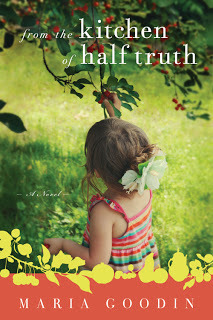
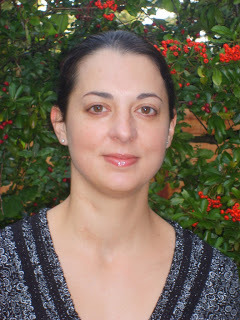
I know how hard it is to get published, and so I always have a soft spot for debuts and debut authors. A publicist I trust told me I'd love this novel--and she was right. I'm so thrilled to have Maria Goodin here to talk about From The Kitchen of Half Truth. Thank you, Maria!
So, this wonderful novel first started out as a short story (which won the Derby Short Story Competition). Did you ever think of it as a novel as you were writing it? What was the process of turning it into a novel like?No, it never occurred to me at the time of writing the short story that I would be turning it into a novel. It was really only winning the competition that made me wonder if it could be extended. Using the short story as a basis for a novel turned out to be a good way of getting started with novel-writing though, because it gave me a readymade structure and made the whole process less overwhelming. It allowed me to see which chapters were blank and needed ‘filling in,’ and then it was a question of developing some new characters and a few more themes.So much of From The Kitchen of Half Truth is about the stories we tell ourselves. Were you always a storyteller yourself?When I was little my friend and I were obsessed by our Sindy dolls for many, many years, and I think that was my first experience of storytelling. We developed and entire world for them, and I think all that make-believe helped develop an active imagination. Playing like that was my first experience of developing characters and storylines. As I got a bit older I became a terrible daydreamer, and was always off somewhere in my head. I was never bored – I seemed to have my own built-in entertainment system.I loved all the cooking lessons that go on in the book. Are you a cook? Do you think there also is a truthfulness to food and cooking, or are there ways we cheat to make food (and our lives) better?I actually don’t like cooking much. I find it stressful and frustrating, usually because things don’t turn out quite like they are meant to. However, I am starting to wonder if I could enjoy cooking if I took the time to get good at it. I have become aware of the fact that although I always say I don’t like cooking, I seem to watch a lot of cookery programmes, spend a lot of time looking at cookery books and I wrote a novel about cooking! That has to say something. Maybe I am a closet foodie.I find the association between emotions and food quite interesting, and I think that is linked to this question about honesty. I think we attribute all kinds of meanings to food, and often those meanings are distorted and dishonest, even though they feel true to us. You just need to look at the number of people who have issues with food to see how complex a relationship it can be; overeating, under eating, depriving ourselves, gorging ourselves…we use food for all kinds of emotional fixes and as a way of communicating things we can’t otherwise say.What's obsessing you now and why?How to balance career and motherhood is probably top of the list right now because with two small children writing is suddenly a lot harder!What question didn't I ask that I should have?How does it feel to have your first novel published? I did wonder if I would have to end up answering that and now I have to think about it!It feels rather surreal when I see my book in a shop or a library. I find myself wanting to pick a copy up, wave it at the nearest person and shout “Hey, I wrote this!” Luckily my son does that for me at my local library, picking my book up and yelling, 'There's mummy's book.”' I feel quite proud and glance around to see if anyone has noticed but they never have. Generally, I would say I feel less of an 'author' than I might have expected. It wasn't like the moment my novel was out I quit the day job and committed myself to a new life. Publication is such a gradual process that the whole thing slowly crept up on me rather than changing anything dramatically overnight. What has really surprised me is how much of my focus has been on 'right, what next?' rather than really savouring the experience. My first aim was to have a novel published. Now I have done that my aim is to have a second novel published. Occasionally I have to look at the copies of my books and remind myself what an achievement it has been to have a book published in the first place, otherwise I find myself constantly looking forward. And this really isn't an experience I want to miss!
Published on March 18, 2013 10:05
Amy Brill talks about The Movement of Stars, chocolate and what's love got to do with it?
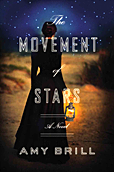
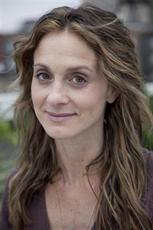
Some novels haunt you. (And that's really my litmus test.) I read The Movement of Stars weeks ago, but I'm still thinking about it, and I'm thrilled to have the author, Amy Brill here to talk about her book and her writing life. Amy's a writer and producer who has worked for PBS and MTV, and has been awarded fellowships by the Edward F. Albee Foundation, the Millay Colony, and the American Antiquarian Society, among others. Thanks so much, Amy!
You said you were inspired by Maria Mitchell, the first female astronomer in America. The book is also set in 1845 Quaker Nantucket and involves whaling. All of these facts absolutely mesmerize me. What was your research like and what took you by surprise?
Well, since I picked a time, place, subject(s), religion, and occupation(s) about which I knew absolutely nothing (note to aspiring novelists: do as I say, not as I did), the more I learned, the more I felt I needed to learn. The research was sometimes a trap, especially because it was my first book. I more or less gave myself a PhD in mid 19th century maritime New England women’s studies, while conveniently avoiding the real work of writing a novel.
The biggest surprise, research-wise, turned out to be essential to the story. When I asked a librarian at the Mitchell archive on Nantucket for journals and letters written when the astronomer was a young woman, she said there were none: Maria Mitchell burned her own papers and diaries in her fireplace during the “Great Fire” of 1846. A third of Nantucket Town burned that night, and people’s private papers were being blown around, so she destroyed hers. I think I just stood there and stared at her, speechless, my writer-brain firing on two fronts. Firstly: Great Fire. What more do I need to say about that? That turned into one of my favorite scenes in the book to write, and one of the most challenging. Secondly: What was she hiding? In that moment, the character of Isaac, and thus the novel that became The Movement of Stars, was born.
So much of The Movement of Stars is about what we will do for what we love, even when the world seems against us. Could you talk about that a bit?
What’s love got to do, got to do with it? I’ll tackle anything that channels Tina Turner. Following one’s passion almost always requires some kind of sacrifice, be it leisure time, or family time, or the pursuit of other endeavors, or of other people, or of money, or of fame—unless fame is your passion, in which case it is statistically likely that you’re wasting your time. Anyway... Hannah sacrifices almost everything in pursuit of her comet, but she is deaf to the music of her heart. She takes a slow road to self-awareness, and since it took me 15 years to finish the book, I took that journey along with her. And by slow road, I don’t mean sluggish, I mean glacial. When I began the book I was single, in my twenties, and searching for both love and my writing voice. When I finished I was married, over forty, and the mother of two very young daughters. I understood her journey quite differently by then. The twin engine of love is discipline. Especially when it comes to surmounting obstacles, be they political, creative, intellectual, or even emotional. You have to carry on, push forward, keep working. Love alone is not enough. I think Hannah taught me that.
I'm always fascinated by process, so can you tell me about yours? Do you map your novels out or go by inspiration?
Oh, I’ve tried everything; mapping, outlining, postcards, winging it. Inspiration is wonderful, but it’s only a leaping off place, an essential spark. After that it’s a hard slog through the swamp. A little bit of structure does go a long way toward getting me started, though; if I know, say, where a story is going, or what happens in part one, part two, part three, that really helps me get off page one and go forward, which is really the only direction you can go if you hope to finish a novel.
This is your debut, but I read that you first came upon the home of Mitchell 15 years ago, which sparked the idea for the book. Can you talk about how that idea crystallized into the novel?
I first learned about “Miss Mitchell” on a daytrip to Nantucket in 1996 (see: glacial pace, above.). I loved the idea of a young woman, a teenager really, up on her roof, searching the sky night after night for something that would change her life. Plus an isolated island, a rigid religious community, whaleships, a country expanding yet divided... what a story! I convinced myself I had to hew unswervingly to the facts of her life, to get it “right”—but in doing so I hamstrung my story. I only realized it when Iberia lost my whole backpack of research, in 2006. (I’m still waiting for the reparation money they promised and never delivered.) After a long break from the novel during which I licked my wounds and whined, I reread what I’d written and realized that I wasn’t telling the story I wanted to tell, which was inspired by Maria Mitchell but not about her. When I started again, I was writing The Movement of Stars.
What's obsessing you now and why?
I’m really into writing short stories again, which feels like a post-novel restorative of sorts. But I’m already turning over a couple of new ideas for longer investigation that I can’t seem to let go of. I’m squirrely like that. I turn an idea over and over and store it in my tree or my cheek or my heart until I’m ready to dig in.
What question didn't I ask that I should have?
If you were stranded on a desert island and could only have one chocolate bar, what bar would it be? I’d have to say that it’s a close contest between Mast Brothers Maine Sea Salt and Equal Exchange Organic Dark Chocolate with Almonds. Can’t have the sweet without the savory.
Published on March 18, 2013 10:00
March 13, 2013
Samuel Sattin talks about League of Somebodies, what it means to be a guy, whether he has webbed feet or not, and so much more
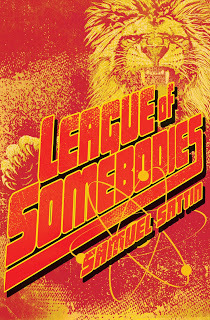
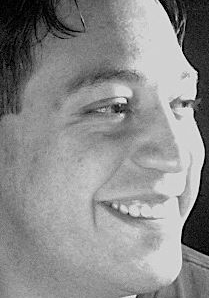
Mat Johnson, author of Pym, Incognegro and Dark Rain, calls the novel, League of Somebodies, "so rich with originality that it's actually radioactive." Cristina Garcia, author of Dreaming in Cuban calls it "a whirling force that blends the family saga, superhero lore, and a coming of age story to a frothy cocktail." Samuel Sattin is an original and I'm thrilled to have him here.
So much of the novel is about what it means to be a superhero and what it means to be a guy. Care to talk about that?
I think the superhero genre, albeit a lynch pin for my personal sanity, is dominated by male heroes, male writers, and an uncomfortable amount of female stereotypes. Of course there are risk-takers, things are changing every day and even the most basal comics have a lot of worth to them. But for the most part, the industry was built upon the shoulders of atypical men shunned either sexually or socially by society. Repressed male identity, and especially repressed male sexuality, is sublimated into the pages of most every comic book from the golden age on. At the same time, however, that sexuality is simultaneously put on absurd parade by practitioners of the genre. In the male superhero we witness a strange embrace AND refutation of traditional male roles, demonstrated by the ironic dissidence between the near-sighted, nebbish comic artist and the 6 foot tall brawny Adonis he proceeds to sketch.
Male identity itself is simply bizarre and grotesque. I grew up surrounded by veritable gorillas who saw themselves as both alpha and omega, viewing the world through a prism of command. Comic books, if anything, allowed me to digest manhood as oblique and exaggerated as a concept. I now view male identity as patently absurd, the byproduct of preternatural insecurity. There's also a tendency towards self (and external) destruction present. I think there's a reason why color blindness is solely a male disability, anyway. Uniformity is essential to the male psyche. Difference is viewed as weak. Danger is overvalued, and exploited for maniacal purposes.
The plot is so knockout original (a dad feeding his boy Plutonium to make him a superhero) that I have to ask, where did the idea for this novel spark? It's absolutely inspired.
Thank you! I'm glad you think so. As I explain a little later, League of Somebodies started out as a completely different book. The characters were mostly there from the beginning (except for Fearghas; you can credit him for the follow-through), but I think I was afraid, or unsure of, how to carry them towards the end. I'm obsessed with comic books, science fiction, and malevolent beings, however. And I was playing with all these ideas RE origin, tradition, legacy, identity. Such traits are the warp and woof of comic world, and heroism, that idea of single human with the weight of the world on his shoulders, is epic in it narcissism, which interests me. Growing up as I did, I learned what it is to be an object of someone's design. And so this idea of the experiment emerged. The desire to turn one's son into a type of Frankenstein. It's perfectly plausible someone has already attempted to do this in real life. I wouldn't be surprised, anyway.
I loved that you carried the idea from father to son to the son of the son, which brings on this whole question of destiny. Do you believe in it? Or do you think we can create our own futures?
Hopefully this won't sound silly, but I believe in both. I think that parents, for example, often attempt to force destiny upon their children (and often for their children's own good!) You wouldn't want harm to come to a loved one, anyway. We enter the world with incredible futures, whether beautiful or terrible, and our parents are responsible for making sure we maneuver reality so that we don't end up in a ditch. But sometimes, a lot of the time, even healthy parental expectations take on too much insistence. We demand our children attain impossible heights. Or we just want them to be so much like us we'll do anything to make it so. But there are always hiccups. Things you don't expect. Sure, a father tries to raise his son to be like him. But sometimes, even if the son follows suit, he starts to wobble. He falls out of touch with who he is. And if that man ends up raising a son, the path he's been taught to follow might falter indefinitely. So in some ways, destiny and self-determination are one in the same. By attempting to make someone into one thing, he or she becomes something completely different.
What's your writing life like, particularly in relation to this wondrous novel? It was so intricately plotted, I want to know if you planned it out beforehand, a la John Irving, or if you just sort of followed your characters' leads?
As mentioned earlier, League of Somebodies was not ever itself to begin with. The book’s first title was The Ivory Flag, and it centered around a mentally unstable suburban father outside of Denver who was erecting a turret atop his Tudor home. At the end of a frenzied year of writing, however, the whole damned narrative ended up crumbling like Pompeii. I only salvaged twelve pages (one particular scene in League is exactly as when I first wrote it). But when the real writing actually began I didn't stop for 2 years. I wrote whenever I could. I wrote through my entire MFA. When I finished my MFA I applied for (and somehow got accepted to) a studio art Masters program for the loan money just so I could make sure the book got finished. In retrospect, it was a stupid, crazy thing to do. I ended up failing out after my first semester. But I knew League needed to be finished and that loan money allowed me to do so. I would have done anything for that time to write. Well, almost anything.
As for the plot, I did somewhat end up letting the characters take me for a ride. But I found myself tinkering with the controls along the way (mostly in favor of sabotage). The structure became the real key to finishing the work. Even if I had an idea of where I wanted things to go, the dimensions of the novel kept on throwing me into a tailspin. I'd take off into tangents, end up in a completely different novel. I had to find a way to connect the two generations of family without dragging on into ubiquity. Once I figured out how to fix that problem, I fell into a speedy rhythm and finished the second half of the book in two months, writing 8 to 10 hours a day. I wasn't sleeping well. It was a manic period in my life, with my mother passing away soon after its completion.
What's obsessing you now and why?
I'm into scary things. Blood, specters, unspeakable evil. Whatever frightens me, really. And hopefully what makes me laugh at the same time. I read The Devil In Silver by Victor LaValle, and was taken by the untapped wealth of the horror genre, how it might be appropriated in an interesting fashion. I've taken up frightening Japanese comics and American horror novels. I watch a lot of strange and eerie films (nothing gratuitous). I've been working on a literary horror novel that I'm hoping will scare the socks off someone, someday. I'm also into political non-fiction and biographies.
What question didn't I ask that I should have?
Is it true that you have webbed feet?
Published on March 13, 2013 18:31
Betsy Prioleau talks about Swoon: Great Seducers and Why Women Love Them, Casanova, why you might not want to find a great seducer, and more
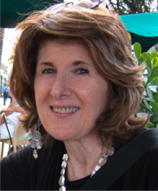
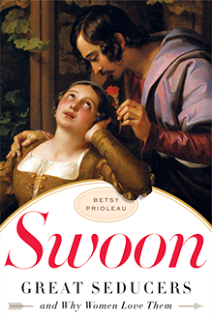
Betsy Prioleau has written one of the most intriguing and delicious books on the planet, Swoon, which looks at the great male seducers and why we love them. She's also the author of Circle of Eros, which is a fresh look at William Dean Howells, who contrary to belief, championed women and permissive sexuality, and Seductress, about the enchantresses of history. I'm thrilled to have Betsy here. Thank you, Betsy!
Your other book, Seductress, was about history’s sirens and now in Swoon, you target the male seducers. So, which sex is more powerful at seduction or is it just different for each?
Seduction is simply the ability to delight and entice people, to win their confidence—and in love, to enamor them. That’s powerful in either sex.The seductive strategies of men and women are similar in many respects. They make the most of age-old courtship charms like dress, dance, and setting, and use the same mindspells, like praise and great conversation. And they invest these allures with artistry.But the male approach is slightly different. Great lovers throughout history take the mating initiative and come on strong. Seductresses beguile and decide. Ladies’ men also play to women’s special desires—for intimacy, romantic ardor, and full-on attention. So, seductresses and seducers wield equal power in romance; they enchant and keep others enchanted. Both employ universal love charms, but tailor them to pack the most erotic punch with the opposite sex.
Did anything surprise you in the writing of this book, especially in terms of overthrowing clichés about what makes a great seducer? (Women want someone who cares about them and understands them!)
I approached ladies’ men full of preconceptions. But after studying great lovers over time, I found that they explode all the stereotypes—those clichés of satanic sexual predators or alpha males with the most money and status and best looks.
Casanovas aren’t models of moral perfection, but they don’t win women through heartless wiles. As a group, they genuinely cherish women, comprehend them, and endeavor to please them. Often poor and sub-average in appearance, they enravish women with their charming personalities and love arts. They are sincere and put their hearts into it. Which doesn’t mean they’re always stable mates. But women adore them—sometimes long-term—because they speak so eloquently to their erotic needs and wishes.
Why do you think studying these great seducers can help both men and women in love?
Great seducers, whatever their faults, are a fabulous resource for men and women in love. Ladies’ men specialize in romantic passion (something not taught in schools), and can help couples make their unions happier and hotter.
Casanovas not only possess a cache of sophisticated amorous arts, they understand how to remain perpetual suitors and keep love fresh. After the “catch,” they scale up physical and psychological charms and insure that romance continues with adventure, novelty, self-enrichment, and a sexy flux of intimacy and independence, concord and discord. Premier lovers, like experts in any field, are prime resources, and what could be more important than romantic love that endures and flourishes?
Which was your favorite seducer and why?
The “dashing little duke,” the eighteenth-century duc de Richelieu (not to be confused with the cardinal in The Three Musketeers), isn’t my favorite seducer, but he’s the most colorful. A statesman, general, and confidant to Louis XV, he was also a “hero of the boudoir,” who “could ruin a woman with a smile.” He had charm to burn—wit, vitality, conversational flair, sweetness, and a taste for fun. He disguised himself as a nun and a peddler to rendezvous with lovers, and once tunneled into a mistress’s bedroom through the fireplace. He received ten to twelve love letters a day, and romanced nearly every noblewoman in Paris, including two princesses. Women were wild for him. So wild, he caused one of the greatest scandals of his day. At one point, two court ladies decided to duel for his favors. They arrived at the Bois de Boulogne before dawn dressed as Amazons, leveled pistols, and fired. The marquise de Nesle toppled to the ground drenched in blood and cried, “My lover is well worth it! Now he will be wholly mine.” She survived, but she was to be disappointed. The duc de Richelieu was too much in demand, too adorable, to belong wholly to anyone.
What’s obsessing you now?
Right now I’m fascinated by Casanova, the gourmet. He lived during one of the most formative periods of cuisine, when habits of consumption, ideas about nutrition, and cooking methods underwent radical changes. Casanova left one of the fullest records of this revolution. He was a great connoisseur of food, which he associated with love and desire: “sex,” he wrote, “is like eating,” and “eating like sex,” and he described hundreds of aphrodisiacal meals in his twelve volume biography. The stories and recipes have never been rendered in English. So that promises to be fun.
What question didn’t I ask that I should have?
What everyone asks: where are these ladies’ men now; where can I meet them? First of all, you may not want to meet them. They can be inconstant and hard to handle. The best course may be to take the seducers’ amorous arts and secrets and pass them onto boyfriends and husbands.
But if you insist on encountering great lovers today, they’re probably right under your nose. They may not be the guys with the pretty faces and big titles; they’re ordinary men with that extraordinary “something”—sexual voltage, respect for women, and love skills that will enswoon you forever.
Published on March 13, 2013 18:24
Gwendolen Gross talks about When She Was Gone, music, horses, and so much more
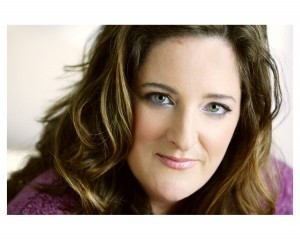
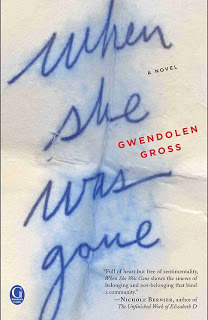
The disappearance of a teen and the secrets of suburbia? I am so there. But her latest novel, When She Was Gone isn't the greatest thing about Gwendolen Gross. I first met her after she had written Field Guild and we became friends. We talked about everything from motherhood to writing nonstop, and she quickly became one of my favorite people in the world. And one of my favorite writers. She's the author of Field Guild, Getting Out, The Other Mother, The Orphan Sister, and I am so deliriously happy to have her here. Thanks, Wendy!
Tell me what sparked this particular novel?
The short answer is that I wanted to explore what happens to a neighborhood when there is a single dramatic event that affects more than one person living there. I wanted to see what happens in each house when a single family is struggling, and to explore exposure, judgment, animosity, support, and acceptance within a neighborhood. Also, Mr. Leonard, the musician who lives alone, is one of my favorite characters.
When I wrote The Other Mother, I had two first person narrators tell much of the same story—neighbors who could see each other out their windows. I wasn’t done with the idea of how we see each other in small frames in a neighborhood, with how people judge each other, speak only briefly to each other, know only certain dramatic things that happen and the quotidian of how we collect our mail and whether we get dressed before we drive our kids to school. Both the idea of support and the idea of judgment are fascinating to me. In a suburban community, rumor travels fast, but friendship can also sustain people so entirely. Sometimes I care deeply what people think, but only the people I respect. I decided to respect my characters whether I found them good or lacking. I suppose there are people in my own life I admire for what they would do for a neighbor.
Why do you think disappearances engage our imagination so much?
I think perhaps our greatest fears involve the things we can’t control---and what the people we love choose to do is one of those things. I also think many of us live in a comfortable frame, and we like to be able to predict what the floor will look like when the elevator doors open, but our job as writers is to ask what if? What if the doors open and there’s a lake on the twenty-seventh floor?
The storyworld--suburbia--is so vivid and important here. Can you talk a bit about that please?
May I quote Ben Folds here, pretty please? “We’re rockin’ the suburbs/Just like Michael Jackson did./We’re rockin’ the suburbs/Except that he was talented.” I’ve lived in cities and in rural places, but most of my life has been in the suburbs, so I’m writing my world. I also think there’s something deeply evocative about the outsides and insides of suburban houses—there’s what we see, and the whole convoluted world of relationships inside the houses. Sometimes sounds leak out that give us clues; sometimes we don’t want to know. Sometimes you see terrifically fascinating things in other people’s recycling. In this book, I was exploring how a neighborhood responds to a crisis, but also how we each live in our own picture, only seeing our surroundings—and the people who live feet away from us--when there’s something new there or when we’re called to attention.
What's your writing life like? Do you outline or just sort of follow your characters? And can you talk about the moment when you knew you were a writer...a real writer?
Yes. That is, I write outlines, and then I just sort of follow my characters, and then I throw all the papers up in the air to see where they land. Each book has been very different. With When She Was Gone, I was quite disciplined, because in order to fit each character into the story, I needed to have some reason they belonged there. I also really wanted to build a sense of suspense, without imposing any artificial notes. With the newest book, I find the thinking is taking longer than usual—and it’s just a single, first-person narrator. Perhaps I’m more caught up that usual in my actual days.
A real writer? I honestly don’t know. I suppose I felt like a real author a few books in, when people asked when the next one was coming, when I had a shelf of things with my name on them. But honestly, I always have something else I want to write, to try, to learn, so the books on the shelf are like photographs.
What question didn't I ask that I should have?
Oh, Caroline, you ask the best questions!
I suppose I could answer this: is there anything you think you would never write?
I’ve been thinking about genre, about how people who write, say, young adult books might try writing adult books and how if you’re famous, you have less freedom to write whatever you think is important, whatever you think you might have to say in a way that is unique. I love having my books out in the world, and I love having people read them, but the creative need to make things, try things, be a beginner, fail and try again will always be there. I think I probably wouldn’t write historical fiction, because I’m probably not disciplined enough to get it all right. But then, I never say never.
What’s obsessing you now and why?
Music and horses. I sound like a teenager. The new novel I’m writing has a composer as a first person narrator—I’m thinking in music some of the time because of her. I went to conservatory at Oberlin, and always felt as though I was living out someone else’s life when I was there. I think in order to be a writer, a musician, a composer, a painter etc. as your primary identity (not necessarily to be a commercial success), you have to have a confluence of things, including talent, passion, and a drive that moves you beyond all the self-doubt and lack of external validation. Then the work itself has to give you a kind of transcendent mode, a pain, a joy, that makes you more alive.
So I relish thinking in music for my character.
And horses, the riding kind, not the racing kind, because my daughter and I went horse crazy a few years ago, and now we are owned by a large pony named Archer, whose moods and well-being and velvet nose magnify our joy. Hitting the dust when we’re riding him, well, it gives us bruises.
Published on March 13, 2013 18:15
New Yorkers! Come see Polly Frost talk about Bad Role Models and What I Learned From them
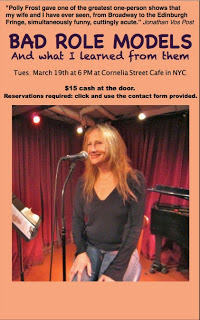
Two things I love. Writer and performer Polly Frost and the Cornelia Street Cafe in the West Village. On Tuesday, March 19th, Polly is putting on her show, BAD ROLE MODELS AND WHAT I LEARNED FROM THEM at 6 PM. In the show, Polly explores great "bad" decisions, It's only $15 at the door and you KNOW you want to go.
Published on March 13, 2013 18:02
March 12, 2013
Therese Anne Fowler talks about her novel Z, Zelda Fitzgerald, whether Zelda would have been happier without Scott and so much more
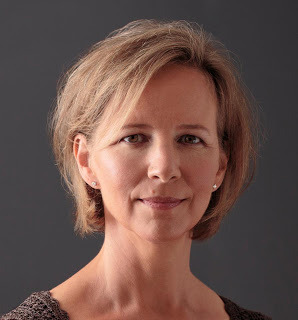
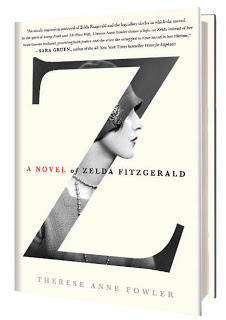
How can anyone resist Zelda Fitzgerald? Especially when she--along with the glittering world of the 20s--begins to breathe on the page courtesy of Therese Anne Fowler (Exposure). I'm thrilled and honored to host Therese here. Thank you so much, Therese!
What is it about Zelda that captures us so much today?
That’s a great question, because really, Zelda is a kind of pop culture Rorschach test. People who think they know who she is have decidedly specific views—and those views vary considerably. She is said to be: the glamorous jazz princess; the feminist first flapper; literature’s most beloved muse; F. Scott Fitzgerald’s jealous, destructive wife; victim of an abusive, domineering spouse; a thwarted dancer, artist, writer; a pathetic crazy woman who spent most of her life in asylums.
Most of the labels are imprecise at best, damaging and false at worst. Zelda was a woman who didn’t always choose wisely, but she was also bold and fearless and talented and witty and fun. She was a celebrity at a time when the term was being coined, and in the early years she loved to play the part. Later she struggled not with schizophrenia, as we know it, but with what was probably bipolar disorder.
Most interesting—and most accurate among popular beliefs: she was devoted, for good or ill, to a man whose vividness and demons and talent are as fascinating as hers.
It struck me that so much of what Zelda dealt with concerning the proper roles of women, especially married women, resonates in today's political arena. Care to comment?
Yes, it resonates all too well. It’s disheartening to see this political and cultural backslide into a mindset that forward-thinking women of Zelda’s era fought so hard to escape. Conservative ideology today looks frighteningly similar to the early twentieth century’s traditional attitudes—men and women both puzzled by any woman’s desire to achieve professional status in any field. They wonder why being someone’s wife, a homemaker, a mother, isn’t sufficiently satisfying to every single woman. Women who desire more (such people say) are clearly acting against nature’s design.
This kind of thinking fails to take into account that nature designed a wide spectrum for pretty much every human attribute, artistic ambition included. It fails to recognize that being forced into a behavioral box of any kind creates far more trouble for individuals and society than it hopes to solve.
What surprised you in the research? And what was your research like?
The biggest initial surprise: that Zelda wasn’t “insane,” as popular culture contends, nor did she spend all her final years locked away in sanitariums.
I was surprised by the thoughtfulness, clarity and wit of Zelda’s letters, essays, and short fiction. Most judgments of her writing are based on her novel Save Me the Waltz, which was written in deliberate modernist style but also done in a tremendous rush under stressful circumstances. And although Scribner’s elected to publish it, they allowed Scott to oversee revisions and it never received sufficient time or editorial oversight for it to be developed and polished into what it could have become. Scott was ambivalent about the work, and Zelda was not, at the time, in a position to assert her will.
I was surprised, too, by how conflicted Scott was about almost every facet of his life. Outwardly he was this modern, dynamic man, a prolific, popular author who’d been deemed the face of his generation, but inwardly he was quite traditional in his expectations of how his personal life should run, what a successful man’s domestic sphere should look like.
My research was a complete immersion into the time and lives of not only Scott and Zelda, but also the people whose lives affected theirs most. Biographies and autobiographies, ledgers, collections of letters and photographs and memorabilia, scholarly essays, reviews, interviews—the body of available information is vast, and filled with contradictory accounts. My challenge was never in finding enough information from which to develop their story but in culling their genuine story from this morass of information and opinion.
I really got the impression that Zelda could have been saved if she had been allowed to be an artist. The so-so reviews seem more to be a product of the times, which didn't understand her, than a true critique of her talent. Do you agree? Do you think Zelda would have been better and happier without Scott?
While Zelda did suffer from what would now likely be diagnosed as bipolar disorder (characterized by episodes of depression and episodes of manic behavior), her troubles were exacerbated and provoked by her situation, Scott’s behavior, societal attitudes, and the prevailing medical beliefs of the time. If she’d been freer to follow her interests, whether in ballet, painting, writing or anything else, I do believe she’d have had far fewer crises, and the ones she did have would’ve been less damaging.
Would Zelda have been happier without Scott? It’s an interesting question, and one that has no easy answer. There’s an argument to be made that if she hadn’t married him, she would have led a far more ordinary life as a Southern wife and mother who, without the influences of the expat life abroad, would never have been compelled to achieve anything of significance. She might have married a decent but far more ordinary man. Would that life have made her happy? It would have been more stable, certainly, but less interesting—and for Zelda, less interesting would equal unhappy.
If she’d been surer of herself when things began to unravel, she might have had the confidence and strength to leave Scott and pursue her dancing and her art. But her illness, over-treated as it was, made her insecure. She feared losing her daughter, she feared losing her mind, and beneath it all she still loved and believed in Scott.
Speaking of Scott, neither he nor Hemingway come across very favorably in the novel. In fact, for all of Scott's worship of flappers and freedom, he's very domineering towards his own daughter, urging her to be more docile. Do you think Scott knew on some level just how talented his wife was?
I think he knew, but he resisted the idea that her talent could or should be accorded real significance. At the time that Zelda’s talents were developing significantly, his weaknesses were beginning to assert themselves, and he had a lot of trouble reconciling all the stresses and conflicts and insecurities. This is the time period when his drinking became seriously problematic for both of them.
For all his flaws, I have real sympathy for him. I have less for Hemingway, but even there, you can see the insecurity at work. How it manifested in each of these men is the telling detail.
What's obsessing you now and why?
I’m so in love with and fascinated by the 1920s that I’m loathe to leave it. In many aspects, the culture and events of the ‘20s forged the modern United States; the Fitzgeralds and their circle are only one element of what made the era so significant. So I’m immersing myself again in history tomes and the literature of the time in preparation to write a new novel set in the era.
What question didn't I ask that I should have?
Readers may wonder why I would write fiction about real people, especially iconic people whose lives have been thoroughly chronicled by biographers and scholars. The reason is that such works, even the best of them, serve up all the factual minutiae and literary analysis one could want but can’t quite illuminate and demonstrate the subjects’ inner lives, their emotional truths, the way a novel can and indeed has to do. We enjoy learning facts about interesting people, but what really intrigues and moves us are their stories.
Published on March 12, 2013 18:25
March 11, 2013
Is This Tomorrow is Indie Next Pick for May!
I am thrilled and honored to report that my new novel IS THIS TOMORROW is an Indie Next Pick for May! The indie bookstores support writers and readers with so much care and attention, and this is just a real honor. Thank you, indie stores, from the bottom, side, top and cellular level of my heart!
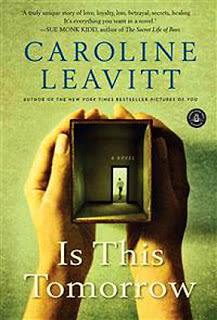

Published on March 11, 2013 11:01
March 5, 2013
David Henry Sterry and Arielle Eckstut talk about M & M Mort Morte, becoming a writer, getting fired from your own business, finding true love and so much more
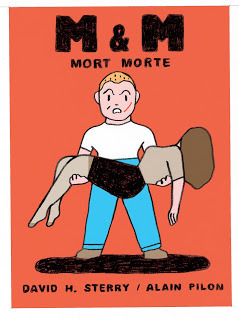
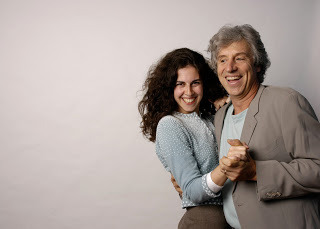
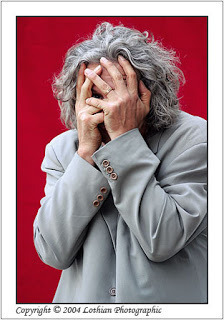
Get ready, because the atoms, protons and electrons are about to go zooming around in high gear--something that always happens when David Henry Sterry and Arielle Eckstut are about. I think I first met them when they were writing The Essential Guide to Getting Your Book Published, a hilarious, smart and uber-practical tome to the publication process. I keep buying up copies of this to give to writer friends. Anyway, I kept running into them at book fairs, and the more I saw of the two of them (they're husband and wife), the more I adored each of them. It's a delight to have them both on the blog, and the only thing better would be to hang out with them over coffee and pie. Thanks, David and Arielle!
Me to David: You are completely hip, hilarious and multi-talented actor, author, performer, screenwriter activist, doting husband and grade A dad. And you’ve got a hell of a backstory to how you got from point a to point b. Want to tell it, please?
Well, thank you, it's awfully nice to see all those attributes in one sentence directed at me. I suppose one's whole life is backstory isn't it? First of all, I'm the son of immigrants. This has in many ways shaped my entire existence. My parents came to this country with basically nothing but the clothes on their back, and after 20 years of hard work, sweat and sacrifice, they were totally broke, getting divorced, and deep in therapy. But they both worked like dogs. No, they worked much harder than dogs. We have a dog who hangs around our house and she never does anything except eat, excrete and lick herself. Doesn't work at all. It was always emphasized to me in no uncertain terms that if you don't work hard you are basically useless as a human. My mom always told me I could be whatever I wanted to be and do whatever I wanted to do. Which was such a great gift. A gift I try to give to my daughter every day. My grandfather was a coalminer. He went down into the pits so early in the morning that it was still dark, and when he came out after shift, it was already dark again. He'd go for a whole week without seeing the sun. So whenever people say to me how hard it is to be a writer, I have to laugh. To sit behind a desk or in a café or wherever and put words together, make up stories, that's cake. When you compare to being a coalminer. And of course my grandfather died of black lung disease when he was about my age I think. It took them 20 years, but the British government finally sent my uncle a check for like $400 or something. To pay for the sins that were committed to my grandfather.
I always loved writing. Ever since I was a tiny little kid. When I was in the third grade we lived in Hueytown Alabama, during the height of the George Wallace Regime, when he was standing in front of school houses with an ax proclaiming, "We're not letting the darkies in here!" Or words to that effect. So they had a writing contest at our school. Well, I should explain there was a big study that came out in which Alabama was rated 50th in the nation in education. That's why they had the writing contest. To prove to the world that Alabama wasn't full of a bunch of illiterate crackers. The subject of the essay was, "Why I Love Alabama." Being the son of an immigrant, I want to win so badly that I basically wrote a propaganda piece for president Lyndon Baines Johnson, Governor George Wallace, America, and of course Alabama. In my memory I won the contest. But I have no proof of this. That's one of the interesting things about writing a memoir. There are certain things you can fact-check. But it's a book of memory. And memory is by its very nature the original unreliable narrator. My immigrant parents were furious when I wrote my memoir. I actually went back and looked at the book very carefully. They are only in the book about two a half percent of the 60,000 words. And well over half the things I say about them are very complementary. I actually catalogued the whole thing. But after my father first read the book, he called me up and started screaming about how the Jaguar he had, which I mentioned in the book, was not blue, it was green. "GREEN!" he screamed. He didn't mention the fact that I wrote about how he basically abandoning me, which led to me getting raped in Hollywood and being sucked into the sex business, which is what the book is about. No, he wanted to talk about the fact that the Jaguar was GREEN! So I started off loving writing, which I still do. Woody Allen said there are only two things in life you can really control. Art and masturbation. Being a professional writer I get to do both those things every day! And I get to control them. There seems so little in my life I can control. This is never so clearly demonstrated as when I ask my daughter to do something. She is 5. She wants to do what she wants to do. All the time. When I write I can make anyone do anything anytime.
But in the end, writing saved my life. I was a drug addict, a fornicator, an adulterer, a problematic hypersexualist, a sinner who wallowed in misery while convincing the world I was a charming, successful humanitarian. Hallelujah, gimme an amen. But when I finally decided to write the truth about myself it really did set me free. I forgave my angry father, and focused on all the good things he did. Food on table, roof over head, clothes on back, the whole nine. I found true love. I stopped having nightmares about the man with the shirt that had SEXY written on it in silvery sparkly letters who brutalized me and tore me in half and traumatized me into a life of PTSD-fueled self-destruction. Writing, a family, friends and gardening, replaced coke, mammoth sexual binges and the relentless pursuit of fool's gold in my life.
Along with your wife Arielle Eckstut (whom I also adore), you created a workshop with a book to go along with it, Putting Your Passion into Print. What would you say are the major mistakes that writers make in trying to get their work out there?
They don't know how to explain what's exciting, funny, thrilling, sexy, informative, inspiring, intriguing, romantic, scintillating, brilliant, new and yet familiar about their book. They don't research to find exactly the right publishing partners. They don't know what other books to compare it to. They don't spend enough time connecting with other writers and readers and industry professionals. They don't befriend their local independent bookstore enough. They don't learn about what's going on in the book business. They chase trends instead of writing something they are wildly passionate about. They don't think of new and exciting ways to present themselves and their material. They don't get enough people to read their writing before they send it out. They send out stuff that's half-baked. Who wants to eat a half-baked meal, no matter how great the ingredients are? The best writing advice I ever got was from my screenplay agent in Hollywood. "Stop sending me these shitty scripts I can't sell." There you have it in a nutshell.
Tell us the backstory behind your extraordinary new book Mort Morte?
I was a screenplay writer in Hollywood. I had a grand house, a fancy car, a long line of beautiful, talented, insecure fiancees in my wake. In short, I was miserable as sin, and my misery always wanted company. My hypnotherapist suggested, after I told her my story, that I should, you know, write about it. Strangely, this had never occurred to me. Even though I made my living writing movie scripts. Plus, I was very ashamed of my secrets. Being British, I was taught in no uncertain terms to be polite and happy and if I had any troubles or problems, I should do everyone a favor and just keep my big fat yap shut. Tight lips and thick skulls, that's what my people are known for. But I gave it my best shot. I went home and tried to write my story. Mort Morte is what came out. The hero, at the age of three, kills his father with the gun his dad gives him as a birthday present. Then he keeps killing the horrible monsterous men his mother keeps marrying. Clearly I wasn't ready to tell my story yet. I hadn't hit bottom. But just as clearly I was working out some stuff.
You make it a point to always be in the public eye, and yet you do it in a way that is so entertaining, people want to see more of you. How do you do such alchemy?
I work hard try to make sure everything I put out has something fun or funny or startling or informative or educational. Certainly I don't always succeed. But I try.
Tell us about your writing/working life. What’s a typical day like?
Wake noonish, take care of emails, social media, Book Doctor stuff. After playing with, reading to, watering, feeding, bathing and storytelling to child, write from 9 PM til 3 or 4 in the morning. We also tour alot, and I always write very productively on planes and in trains.
What’s obsessing you now and why?
What to do about the gun violence epidemic. What makes Breaking Bad so good. Exactly how do Gilligan take a moral, upstanding high school chemistry teacher family man & turn him into a meth cooking killer that you're rooting for. Getting my memoir Chicken made in Hollywood. Protecting my five year old from Disney.
What questions didn’t I ask that I should have?
What's your next project? And what's the meaning of life?
I'm finishing my first full-length solo novel, The Valley of Love & Delight, which is a ghost story featuring the Shakers, a religious group from the 1800s who made great furniture and didn't believe in sex. There are no more Shakers. I have an anthology coming out in April called Johns, Marks, Tricks & Chickenhawks, it's all writings by people how sell and people who buy sex, it's the follow up to Hos, Hookers, Call Girls & Rent Boys. A novel I wrote with the Zimmermen twins called The Hobbyist comes out in May. What Are They Thinking?, a book I co-wrote with the lovely and talented Arielle Eckstut and two Duke brain scientist, about the teenage brain, comes out with Norton in June. And then the ten year anniversary of Chicken comes out in July I think.
To help the species evolve successfully, to create things of value, and to have and bring joy that doesn't come at the expense of others.
Me to Ariel: Tell us about Little Miss Mismatched, your uber cool company?
I co-founded LittleMissMatched around 2003. I had always wanted to start my own company. And I had always wanted to be a designer. I got to do both things, so it was a very exciting time for me. The mission behind the company was to inspire creativity and self-expression in girls. The hook was that we sold socks that don't match in packs of threes--a pair and a spare! Before long, we were also making pajamas, bedding, furniture, clothing and books. We were going against all the conventional wisdom of what a tween girls' brand had to be (lots of pink, lots of oversexualization) and we turned the industry a little bit to the left. That was what was most exciting. But our success--or what I termed success--was short-lived. The majority share of our business was bought by a private equity firm. I was fired, the business became just one of the many to follow whatever trend was winging its way through the world of kid's fashion, and the mission of the brand got lost. I bring this up because when I got fired, I was unexpectedly launched back into the world of publishing. I had been an agent for over 10 years prior to starting LittleMissMatched. And when I returned to publishing, I was a veteran of an entirely different industry. But one that made me a much more successful writer and consultant to other writers. I had an understanding of business and marketing that I never would've had if I stayed in publishing. The rag business is in no way refined. And I learned a far more rough and tumble, aggressive, customer-centric style of doing business.
How did the two of you start working together and what's that been like?
In about 1996, my godmother called me to say that one of her clients (she was an agent for actors) had written a manuscript. She asked if I would look at it. It was experimental literary fiction. Not something I represented. But I read the first few pages and I was astonished. It was one of the most original, creative things I had ever read. Sadly, I lost the manuscript and was too guilty to ask for it again. Fortunately, David is very persistent. He's written about this time from his perspective. But let's just say that it took a very long time for me to actually read the entire book. By December of 1998, I finally had. We had already once met briefly. David was engaged at that time. I thought he was exceedingly adorable, but, well, engaged! When I saw him again in 1998, he was not. We essentially moved in together that day!
As a literary agent, what mistakes have you personally noticed that writers make?
Number one mistake is that they don't do their research. This comes in many forms. They send their sci-fi manuscript to agents who don't represent sci-fi. They don't know their category. They've written a sic-fi novel, but have never read one. They don't know how the business works--what a proper pitch is, how to address an agent properly, etc. You have to be a student of publishing and a massive reader of your category of the bookstore to succeed. What attracts your attention? Someone who does the opposite of the person described above! Someone who knows what the agent actually represents and has a reason for querying him/her. Someone who can name authors that aren't just NYT bestsellers in their categories. Someone who spends time in the local independent bookstore. Someone who has already connected to their potential readers.
Published on March 05, 2013 14:16
February 28, 2013
Ann Hood talks about The Obituary Writer, yarn bombing, writing and so much more
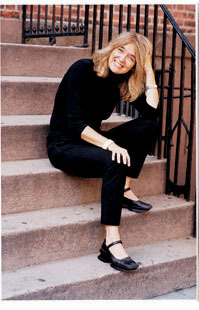
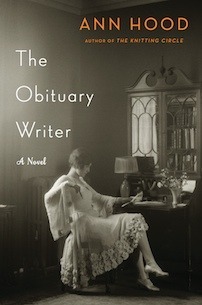
I swear I met Ann Hood many years ago when she was working as a flight attendant, although maybe I just like to think that I met her. I was three hours early for a plane (typical Leavitt) and reading a book and this blonde woman in a uniform swept through, glanced at my book and said, "That's a great book! I loved it!" and then continued to rush by me. Well, she looked like Ann Hood, anyway, and maybe that counts, too. In any case, I'm thrilled to host Ann here and have her talk about her sublime new novel, THE OBITUARY WRITER, which is both a meditation of lost chances and grief, as well as a stunning story of two women who are decades apart--yet closer than they could ever imagine.
Ann Hood is also the author of the bestselling novel, THE KNITTING CIRCLE, THE RED THREAD, and the memoir, COMFORT: A JOURNEY THROUGH GRIEF, which was named one of the top ten non fiction books of 2008 by Entertainment Weekly and was a New York Times Editor's Choice. Her other novels include: WAITING TO VANISH, THREE-LEGGED HORSE, SOMETHING BLUE, PLACES TO STAY THE NIGHT, THE PROPERTIES OF WATER; SOMEWHERE OFF THE COAST OF MAINE, and RUBY She has also written a memoir, DO NOT GO GENTLE: MY SEARCH FOR MIRACLES IN A CYNICAL TIME; a book on the craft of writing, CREATING CHARACTER EMOTIONS; and a collection of short stories, AN ORNITHOLOGIST'S GUIDE TO LIFE.
Her essays and short stories have appeared in GOOD HOUSEKEEPING, THE NEW YORK TIMES, LADIES HOME JOURNAL, MORE, TIN HOUSE, PLOUGHSHARES, and THE PARIS REVIEW. Ann has won a Best American Spiritual Writing Award, the Paul Bowles Prize for Short Fiction, and two Pushcart Prizes. She now lives in Providence, RI with her husband and their children. I'm so jazzed to have Ann here. Thank you, thank you, Ann!
I loved the two time frames, the sixties juxtaposed with the early nineteen hundreds. What made you focus on these two particular times? What sparked the whole idea of the novel for you?A few years ago I went to a dinner party and was seated next to a charming man. We had a great time chatting and laughing all night. A week later, he died. And his partner asked me to write his obituary. I didn't know how to say no, but I also didn't know how to actually do it. His partner said he wanted it more like a short story than an obituary. I happen to be a fan of obituaries. And I own a copy of the late NYT obit writer, Robert MacG Thomas' collected obituaries. So I turned to them for inspiration. But the responsibility of capturing a life--really capturing it--in such a short space got me thinking about obituary writers. Around the same time, April 18, the anniversary of my daughter's death, came. As I do every morning, I read The Writers Almanac on line and learned that April 18 is also the anniversary of the 1906 earthquake in San Francisco. Themes of loss, personal and more global, came together in that moment, and Vivien was born. Her story unfolded easily, but it seemed more a novella than a novel. Then, months later, I was sitting in an auditorium watching Obama's first inauguration and got swept up in the hope all around me. I actually went to JFK's inauguration as a very little girl, and I remembered that same sense of hope and optimism. What if a woman from a time of hope felt hopeless? Two women in two times. The stories seemed to fit somehow. And then I was on my way.So much of The Obituary Writer is a gorgeous meditation on loss and longing and the ways we try to keep hold of the things that we cannot. There’s a line in the book that really got me, when Vivien says, “Don’t waste your one beautiful life.” Can you talk about that line in relationship to grief?That line was probably the hardest line to write. Vivien needed to capture so much in that moment. And I had a lot of mis steps in trying to find the right, true words. Vivien is at the end of her life and her grief, though still present, has taken on a different shape. She can look at it almost objectively through the lens of time. It's advice that's hard to hear or understand when you are closer to grief, but it resonates despite that.The novel is so exquisitely detailed that I want to ask you about the research. What was that like? Where were the surprises?I knew exactly nothing about San Francisco in 1906. Except the earthquake happened and I watched a kind of cheesy touristy film about that years ago in San Francisco. I immersed myself in books about the earthquake, wrote to the Napa Historical Society, that kind of thing. One night I watched Sixty Minutes, which I never watch. And they showed a lost film taken on Market Street the day before the earthquake! Honestly, I hadn't watched that show since I was in college and it had just what I needed on it that night. The film went online and I studied it quite a bit. The 1961 details were easier. I was only 4 then, but I have vivid specific memories of that time. I had to check them--the songs, etc. for accuracy. And I bought a pile of women's magazines at a junk shop for recipes and things. I love doing research. I wouldn't say there were surprises; rather I kept getting delighted. By the wine growers in Napa, the suburban housewives of the early 60s...I read every newspaper account about JFK and Jackie and the inauguration. I loved getting lost in all of it.Let’s talk about my favorite subject: craft. What kind of writer are you--or were you--for this particular book? Were you drowning in pages of outlines or did the story unfold almost organically? And what’s your daily writing life like?My writing process is always a combination of outlining and organic storytelling. This one required a lot of precision. Things had to happen at certain times. So I was perhaps a bit more committed to an outline for plot points. But I like having a blueprint. I think it allows creativity to blossom. Without it, I feel like I'm throwing rubber bands at the stars. And missing too many times.I write for two hours every day. But once I get to about page 50 in a novel my writing time is much longer. More like four or six hours a day. After that I reach a law of diminishing returns and the prose isn't very good. My husband just created a gorgeous new knitting room for me and it has a daybed with piles of pink pillows. That's where I've been writing these days. I like to write partially reclined and propped up with pillows.What's obsessing you now and why?Right now I'm obsessed with yarn bombing. That's when someone knits a public structure--a statue, a phone booth, a bus. I mean, they knit over it so that the thing is wearing like a coat. My next novel--which is really a mess of about 30 pages right now--has a yarn bomber as a character. So I'm collecting photos of yarn bombed things and reading about the bombers. It's also called guerrilla knitting.Any last words?I remember Russell Banks describing alternating POV chapters in CONTINENTAL DRIFT by saying that the reader has to reach the end of each section wanting to stay in that time and place every time. That was the challenge for me. I needed the reader to not want to leave Vivien when her section ended, then not want to leave Claire. Every time. But I love a writing challenge like that.
Published on February 28, 2013 10:06



